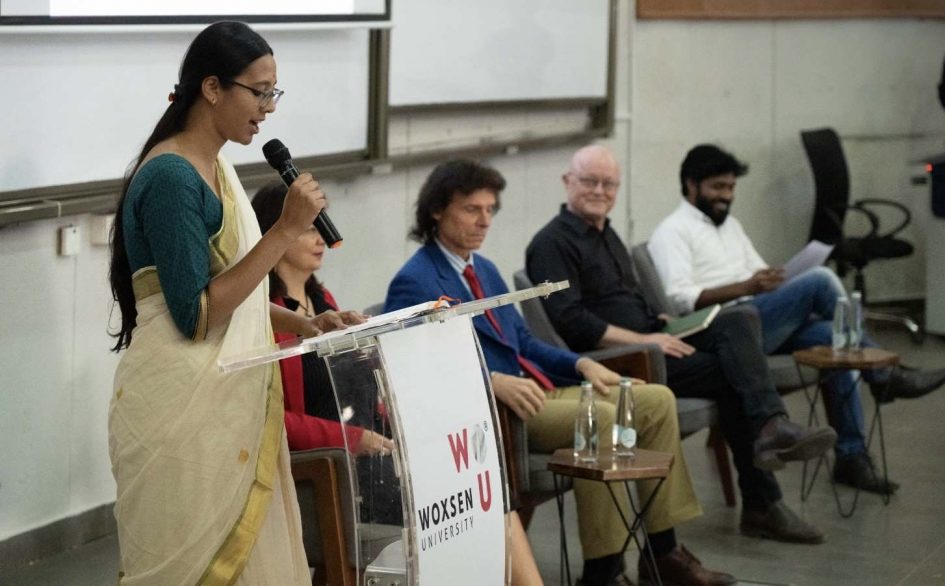Sixth International Deleuze and Guattari Studies in India Collective Conference 2025
Metamodeling the Future:
Philosophy in the Age of Intelligent Machines
Organized by Deleuze and Guattari Studies in India Collective in collaboration with Woxsen University, Hyderabad, India
Venue: School of Liberal Arts and Humanities, Woxsen University, Hyderabad, India
Conference Convener
Dr Manoj NY
Assistant Professor
Easwari School of Liberal Arts
SRM-AP University
Gen Secretary, DGSIC
The Sixth Deleuze and Guattari Studies in India Collective Conference in India in the series was held from 17 to 20 February 2025. This conference was hosted by Woxsen University, Hyderabad, India. This conference comprises of two events – two days international camp focusing broadly on the philosophical system of Deleuze and Guattari (17-18 Feb 2025), specifically on the theme ‘Philosophy’s Infinitude: Chaos, Machine, Virtual’ and the two days international conference on the theme ‘Metamodeling the Future: Philosophy in the Age of Intelligent Machines’ (19-20 Feb 2025).
Conference Theme
Originally developed by Félix Guattari to position schizoanalysis as an alternative to psychoanalysis—which he deemed dogmatic, repressive, and authoritarian, — “metamodelization” has emerged as a central, influential concept in continental philosophy. Unlike the straightforward technical or empirical modeling of a rigid system or phenomenon, it represents a reflexive, layered, and mobile modeling process that serves as a framework for understanding the complex and dynamic relationships among systems, subjects, and their environments. Metamodelization accounts for the forming and deforming, molding, and plasticity of systemic autopoietic processes. For Guattari, metamodelization is driven by desire, difference, and a future-oriented dynamism, making it both combative and revolutionary.
As its influence has deepened, philosophy itself has come under the sway of its own metamodelization, reshaping both its internal form and function. Yet notably, the metamodelization of philosophy parallels similar processes within capitalism, to which philosophy is now irrevocably bound. Philosophy mirrors the rampancy and fascism of planetary cybernetic capitalism. Today’s algorithmic capitalism is characterized by digitalization, artificial intelligence, machine learning, and surveillance, and philosophy has fallen under its seduction. This “quaternity” has transformed early capitalism—rooted in industrial production and physical goods—into a phenomenon aggressively powered by data extraction, algorithmic decision-making, and labor automation. As a result, every aspect of modern life, from labor markets and consumer habits to privacy and morality, has been redefined, introducing new ethical, social, and economic challenges.
In this context, it becomes evident that philosophy’s established frameworks—centered around concepts like subject-object opposition, consciousness, agency, reason, rationality, dialectics, spirit, and contradiction—struggle to capture these evasive and invasive processes. Only a metamodeled philosophy, capable of generating new concepts and embracing inter-, trans-, and multidisciplinary perspectives, can fully address the challenges posed by contemporary capitalism.
Fortunately, Guattari and Deleuze provide a theoretical path in this direction. Yet further experimental work is needed to advance the metamodelization of philosophy, and this conference aims to foster a transversal, exploratory dialogue toward that end. We are aiming to undermine the discipline of philosophy to remodel it afresh.
Themes of the conference (not limited to those listed below):
- Artificial Intelligence and Neurocapitalism
- Surveillance and Identity
- Algorithmic Cultures of Oppression
- Apparatuses of Capture and Control Societies
- Machines and Body in AI
- Desiring Machines and AI
- Becoming Machine and Posthuman futures
- Capitalism, AI and BWO
- Time, Memory and Desire
- Networks and Integrated World Capitalism
- Contemporary Necropolitics
- Deleuze, Guattari and Transdisciplinarity
- Post/Trans/Antihumanism
- Art, Cinema and Literature
- Postcolonial Differentials and Ethnic Issues in Asia
- Pandemic, Illness and the New Biopolitical Regimes
- Deleuze, Guattari and the Crisis of Capitalism
- Diagrams of Caste, Culture and Indian Society
- Ecosophy and Anthropocene
- Deleuze and the Ontological turn
- Deleuze and New Technology
- Borders and Becomings
- Planetary Thinking and Sustainability
Plenary Speakers and Themes:
- Eva D Bahovec, University of Ljubljana, Slovenia – Are Intelligent Machines Male or Female?
- Joff PN Bradley, Teikyo University, Japan – Hikikomori (social reclusivity), loneliness, autism, collapse of desire: On Japanese subjectivity
- Ian Buchanan, University of Wollongong, Australia – The body without organs and the algorithm
- Felicity Colman, University of the Arts, London – The void of human perception: AI-Generated systems and quantum modality
- Gary Genosko, Ontario Tech University, Canada – The Prospects of Polyphonic Federalism in Guattari’s Chaosmosis
- Chantelle Gray, University of Johannesburg, South Africa – Do Deleuze and Guattari have an organology?
- Meenu Gupta, Panjab University, India – Neuroaesthetics as a Metamodel in the World of AI: A Deleuzo-Guattarian Tool with an Indian Aesthetic Lens
- Jay Hetrick, University of Sharjah, UAE – Beyond Stupid: The Strange Machines of Yuko Mohri
- Tatsuya Higaki, Osaka University, Japan – To be announced
- Alex Taek-Gwang Lee, Kyung Hee University, South Korea – Guattari’s Leninism
- Sebastian Hsien-hao Liao, National Taiwan University, Taiwan – Our Obligations to Rocks: The Need to Radicalize Posthumanism in the Age of AI
- Chun-Mei Chuang, Soochow University, Taiwan – The Gravity of Life: Metamodelling A Trans-Species Quantum Mechanosphere
- Manoj NY, Woxsen University, Hyderabad, India – Resistance in the Age of AI: Posthuman Inquiries
- George Varghese K, President, DGSIC – Between Guattari and Lacan: Unconscious as an Abstract Machine
